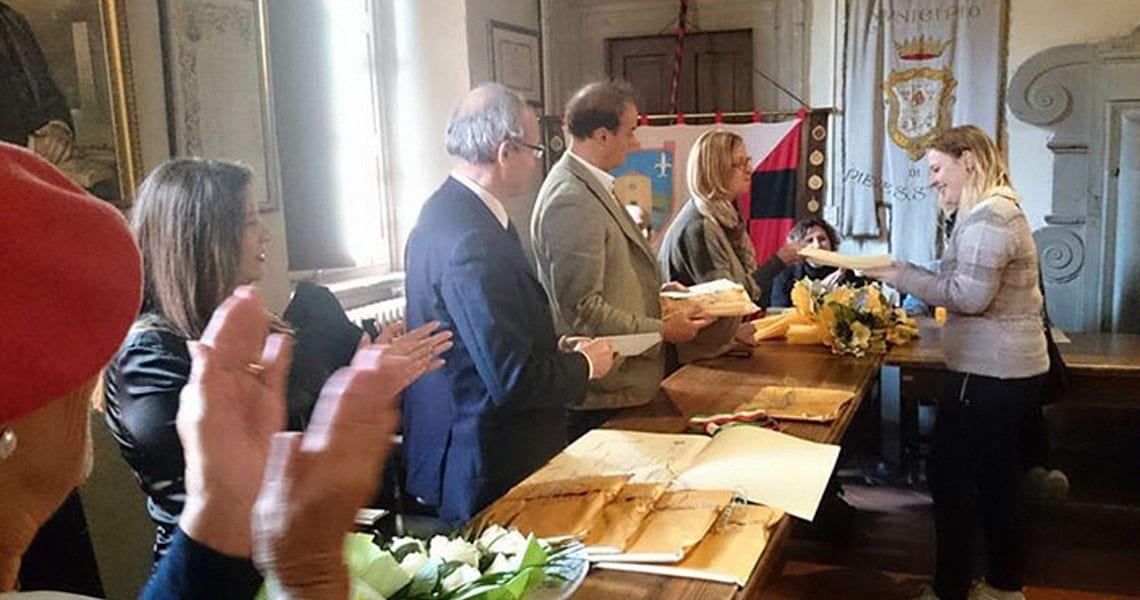Tratos founder Egidio Capaccini was the inspiration for the company’s award for school children achieving the best academic performance and it was with great pleasure that Tratos made awards, in his name, to eight winners earlier this month (November).
Egidio Capaccini’s story is also linked to a modern day celebration of applied intelligence, endeavour and achievement. Born in Pieve Santo Stefano November 24, 1918, Egidio lived a short (he died at 56) but full life that made an impact and left a thriving legacy of innovation and ingenuity that is still alive almost a century after his birth.
Best known for founding Tratos Cavi (Cables), now a leading group of international companies which still has its roots and the majority of its workforce in the Tiber Valley, Capaccini’s real story starts much earlier.
After the war, the inhabitants of his village returned after forced deportation in the summer of ’44. On returning to Pieve they found the countryside entirely destroyed by German mines, including all the bridges over the Tiber.
Appalled, shocked and demoralised, the returned villagers wandered in disbelief among the destroyed houses and their ravaged surroundings. To add to the mounting distress as they took in the scale of destruction, it soon became clear that the village was physically isolated by the damage too. To get to anywhere, they had to cross the river, and without a single bridge left standing it was clear that river passage was going to be a defining challenge.
The tragedy of death and blood had yet to finish. It played out for months, with at least a hundred more deaths as unexploded mines continued to claim lives after the end of the war. In the cold light of day, the challenges looked insurmountable. Villagers were overwhelmed and in those darkest moments there was a growing temptation to turn their backs on their homes and walk away.
Instead, Egidio Capaccini, a leading community figure, looked for solutions. Rather than lose heart, he put his heart and soul into building a bridge over the Tiber; and he did it in record time.
With an innate talent for engineering and construction and help from willing volunteers, the project gained momentum. Reclaiming as much material as possible from the destroyed bridges, the rebuild began.
Capaccini’s bridge may have been makeshift, but it was ingenious. Strong enough to carry vehicles and small trucks, it was the gateway that allowed the reconstruction of the town centre.
More than just’ a bridge, it was a symbol that instilled hope as it forged a pathway to restoration after the wartime devastation.
Subsequently Egidio emigrated to Argentina, as did many others to find employment, but as soon as he could, (in the early 60s) he returned and founded Tratos. In so doing, he secured the future prosperity and employment for generations of the local community.
It’s fitting, then, that the best educational performance is recognised in Egidio Capaccini’s name.
For decades Tratos has acknowledged the best academic performance of the children in Pieve. The awards are also supported by the Cassa di Risparmio di Firenze SpA, who co-fund the prize money.
The eight winners for the school year 2014/15 are: For colleges: Biagio Valenti, Matilde Gorini, Eleonora Pelizzo, Marco Falasconi, and for High Schools: Muzlija Valon, Sarah Giannini, Gabriele Seoli and Sabir Hayat.
A ceremony was held Sunday, November 1 at the Municipal Council of Pieve Santo Stefano, and attended by the Mayor Bragagni and the daughter of Egidio Capaccini, Ms Marta.
The event was preceded by a wreath-laying at the annual commemoration of the fallen of all wars, at the war memorial. Attendees included authority representatives and members of local law enforcement. The Philharmonic Brazzini provided the music for the ceremony.
The Egidio Capaccini’s tenacity and the triumph of the bridge’s construction together symbolise the link between life at school and the world of work; between learning, and the thinking that will deliver the future.










